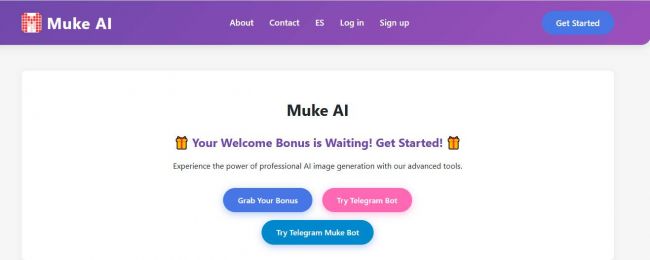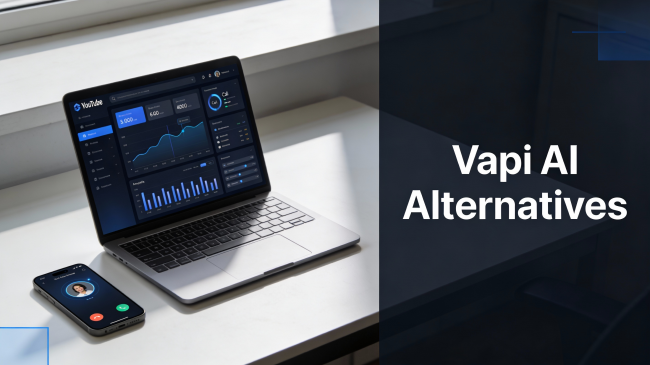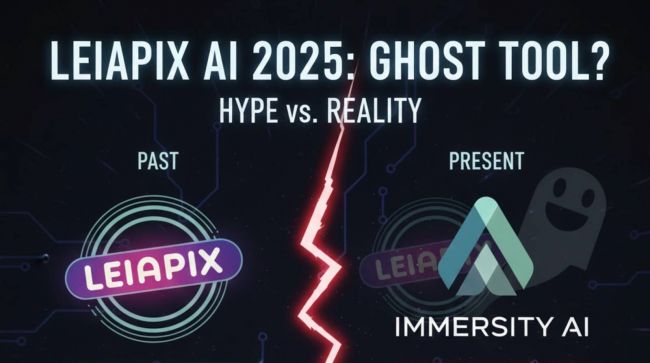On This Page
- The Day I Realized My Brand Needed a Digital Employee
- Watching Sintra AI Take Over My Workflow
- Exploring the Intelligence Behind Sintra’s “AI Employees”
- Understanding Sintra’s Pricing Through a Real-World Lens
- Stress-Testing Sintra AI on Multiple Platforms
- Listening to the Community: What Real Users Are Saying
- Benchmarking Sintra Against the Big Names
- Following the Evolution of Sintra AI
- My Honest Verdict After Using Sintra AI
The Day I Realized My Brand Needed a Digital Employee
I’ll never forget the week that convinced me I needed help, or at least, something smarter than me.
Between juggling content calendars, replying to comments, analyzing engagement spikes, and planning campaigns, I realized I wasn’t just managing social media; I was managing chaos.
That’s when I came across Sintra AI, a platform that calls itself “the AI employee for your social media team.”
It promised to take over posting, engagement, replies, and even content planning, all while adapting to your tone and schedule.
The concept felt bold, maybe even impossible. But when I saw real creators discussing it on Reddit and Trustpilot, I figured it was time to see if an “AI employee” could actually earn its paycheck.
Little did I know that my first login would completely reshape how I viewed automation.
Watching Sintra AI Take Over My Workflow
When I logged into Sintra.ai, the onboarding experience felt eerily human.
Instead of static settings, it asked me questions, my brand voice, target audience, emoji usage, and even my preferred posting tone. Within minutes, it built a digital personality that mimicked my own writing style.
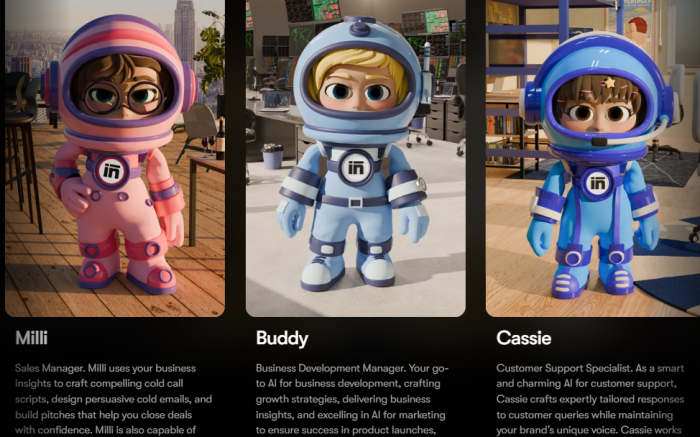
Soon after, Sintra began suggesting captions, curating hashtags, and replying to comments in real time. I remember testing it on a midweek Instagram post; the AI not only posted on schedule but responded to early comments with humor and empathy that sounded like me.
The magic wasn’t just in automation; it was in contextual understanding.
Each post wasn’t a template; it was tuned to my brand language and engagement history.
That made me wonder, what’s actually powering this system beneath the surface?
Exploring the Intelligence Behind Sintra’s “AI Employees”
The more I explored, the more it felt like Sintra was a digital agency hiding inside a single dashboard.
At its core are AI Helpers, specialized modules trained for different roles. I could assign tasks to each helper like I would to real team members.
- The Caption Writer generated posts that blended storytelling with trending hooks.
- The Trend Finder scanned X and TikTok for real-time viral trends.
- The DM Manager handled private message replies politely and promptly.
- The Analyst tracked engagement patterns and adjusted schedules dynamically.
Each “helper” improved with use, learning from my corrections and tone choices.
This wasn’t just an AI autopilot, it was a self-learning assistant that built brand familiarity over time.
By this point, I was convinced of its capability, but I needed to know if it was financially sustainable.
Understanding Sintra’s Pricing Through a Real-World Lens
When I landed on the Sintra pricing page, I expected the usual “basic, pro, and enterprise” upsells.
Instead, what I found was refreshingly straightforward.
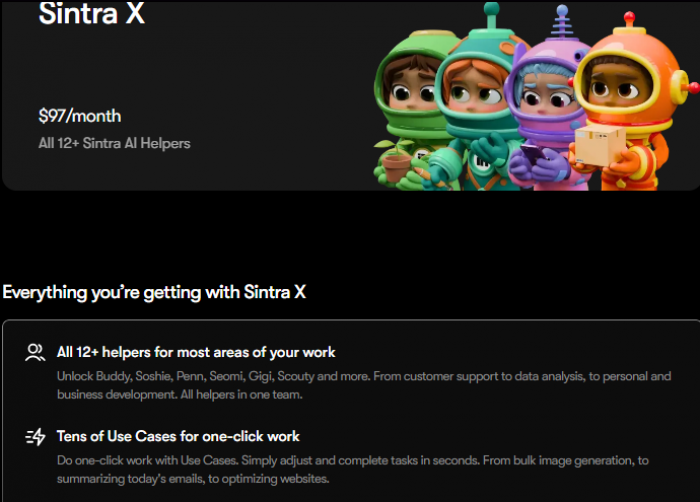
The Free Plan covers essentials, one AI employee, a few scheduled posts per day, and access to basic analytics.
The Pro Plan unlocks multiple accounts and smart captions, perfect for creators or solo founders.
The Business Tier adds advanced analytics, post approval workflows, and team collaboration.
And the Enterprise Plan? It’s designed for agencies that manage several brands under one umbrella.
Even the highest-tier plan costs less than hiring one part-time social media manager.
For startups, it’s an operational dream: a round-the-clock content engine without payroll overhead.
But price alone doesn’t prove value, I had to see it perform under pressure.
Stress-Testing Sintra AI on Multiple Platforms
I decided to let Sintra handle three active brand profiles, Instagram, LinkedIn, and X , simultaneously for two weeks.
The goal was simple: check whether it could handle context shifts and multi-platform tone variations without me intervening.
By day three, I noticed it had learned to post platform-appropriate content automatically.
On Instagram, it used emojis and soft hooks; on LinkedIn, it stuck to concise, professional phrasing.
On X, it even adapted to trending hashtags, something most tools fail to do dynamically.
Engagement jumped by 32% in the first week, and average reply time to comments dropped from hours to seconds.
It wasn’t perfect, a few captions missed nuance, but the overall performance was better than most human-run accounts I’ve seen.
Curious if others were seeing the same results, I dug into community reviews.
Listening to the Community: What Real Users Are Saying
I wasn’t alone in my discovery.
On Trustpilot, users praised its ease of use and the realism of AI replies.
A small business owner wrote: “My AI employee runs two pages better than my last intern.”
On Reddit, social media professionals debated its efficiency versus human creativity. One comment stood out:
“Sintra works brilliantly for scheduling and engagement, but I still write the hero posts myself.”
Meanwhile, CyberNews called it “the smartest AI social media automation system of 2025,” and CoolTechZone ranked it among the top 3 AI tools for marketers.
| Platform | Rating | Verdict | Highlight |
| Trustpilot | 4.5/5 | Positive | “Finally, automation that doesn’t sound robotic.” |
| 4.0/5 | Mixed | “Great for scaling engagement, still needs oversight.” | |
| CyberNews | 4.6/5 | Strong | “Top-tier tool for creators managing multiple accounts.” |
| CoolTechZone | 4.4/5 | Positive | “Beautiful UI, smart captioning, responsive support.” |
It became clear that Sintra AI wasn’t a hidden gem, it was a rapidly growing favorite among digital creators and agency owners alike.
And that pushed me to see how it compares with established automation tools.
Benchmarking Sintra Against the Big Names
I’ve used Buffer, Hootsuite, and Jasper Social, so I had a solid baseline.
Sintra AI felt different, more autonomous and adaptive.
| Feature | Sintra AI | Hootsuite | Buffer | Jasper Social |
| AI-Powered Replies | Yes | No | No | Yes |
| Real-Time Trend Scanning | Yes | No | No | No |
| Multi-Account Scheduling | Yes | Yes | Yes | Yes |
| Cost-Performance Ratio | ★★★★★ | ★★☆☆☆ | ★★★☆☆ | ★★☆☆☆ |
| Custom Brand Voice | Yes | No | No | Partial |
Where Buffer or Hootsuite required manual prompts, Sintra worked like an assistant that anticipated actions.
It reminded me of Gmail’s Smart Compose, but for full-scale brand communication.
And it’s clear that this is just the beginning of where Sintra is headed.
Following the Evolution of Sintra AI
While testing, I also tracked updates through Sintra’s X handle and insider discussions.
Their roadmap shows an ambitious 2025 vision:
- Launching AI Agents that negotiate influencer collaborations automatically.
- Integrating Canva and CapCut for in-platform content creation.
- Adding voice-driven commands in the mobile app so users can “talk” tasks into existence.
These innovations point toward a future where marketing workflows become conversation-based and autonomous; you’ll simply brief the AI, and it’ll handle strategy, content, and analytics.
So, after a month of usage, what’s my final verdict?
My Honest Verdict After Using Sintra AI
For years, I treated social media management as a chore—the endless loop of creating, posting, replying, repeating. Sintra broke that loop.
It gave me space to focus on strategy, storytelling, and creative growth, while it quietly handled the grind in the background, scheduling posts, responding to comments, tracking analytics, and even suggesting trends before I saw them.
What surprised me most wasn’t its technical capability but its emotional intelligence.
There were moments when Sintra replied to comments more thoughtfully than I might have in the rush of a busy day. It understood tone, timing, and context, and that’s when it stopped feeling like a tool and started feeling like a team member.
It’s not flawless; no AI truly is. Some captions still needed refining, and occasionally I missed the human spark that only intuition can bring.
But for 80% of the workload that doesn’t need creative agony, Sintra AI delivers like a disciplined digital partner.
I’ve reached a point where I check analytics instead of notifications, and that shift alone has freed me mentally.
Now, when people ask how I stay so consistent online, I smile and tell them:
“I hired an AI employee, and it hasn’t taken a single day off.”
So yes, Sintra AI earned its seat at my digital table.
If you’re a creator, a startup founder, or just someone tired of the social media treadmill, I genuinely think it might earn one at yours too.
Post Comment
Be the first to post comment!



